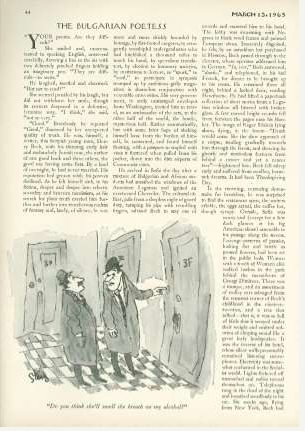Alexandra K. Glavanakova, of Sofia University, St. Kliment Ohridski, recently published an essay on “Authenticity and Autofiction: John Updike’s ‘The Bulgarian Poetess'” online at escholarship.org, where a full-text version is available.
 ABSTRACT: This article provides an innovative perspective on John Updike’s visit to Eastern Europe in the 1960s, including Bulgaria, as reflected in his short story “The Bulgarian Poetess” first published in The New Yorker on March 13, 1965. The inspiration for this interpretation is as much academic as it is anthropological. It comes from Updike’s use of my own surname, Glavanakova, which is not a common Slavic one, for the fictional character of the real-life Bulgarian poetess he met, whom researchers have established to be Blaga Dimitrova. Many have delved into the text aiming at a detailed and, more significantly, an authentic reconstruction of events, places and people appearing in the story (Katsarova 2010; Kosturkov 2012; Briggs and Dojčinović 2015). A main preoccupation of these analyses has been to establish the degree of factual distortion in Updike’s representation of the people and places behind the Iron Curtain. The pervasive imagery of the mirror, implying both its reflecting and doubling function, and the repetitive use of cognates associated with truth and honesty in the story suggest the focus of this article, which falls on the dynamics between authenticity and artifice from the perspective of autofiction by way of illustrating how one culture translates into another “at the opposite side[s] of the world” (Updike, “The Bulgarian Poetess”). In my interpretation, autofiction opens ample spaces for representations and discussions of identity and self-/reflexivity in a transcultural context.
ABSTRACT: This article provides an innovative perspective on John Updike’s visit to Eastern Europe in the 1960s, including Bulgaria, as reflected in his short story “The Bulgarian Poetess” first published in The New Yorker on March 13, 1965. The inspiration for this interpretation is as much academic as it is anthropological. It comes from Updike’s use of my own surname, Glavanakova, which is not a common Slavic one, for the fictional character of the real-life Bulgarian poetess he met, whom researchers have established to be Blaga Dimitrova. Many have delved into the text aiming at a detailed and, more significantly, an authentic reconstruction of events, places and people appearing in the story (Katsarova 2010; Kosturkov 2012; Briggs and Dojčinović 2015). A main preoccupation of these analyses has been to establish the degree of factual distortion in Updike’s representation of the people and places behind the Iron Curtain. The pervasive imagery of the mirror, implying both its reflecting and doubling function, and the repetitive use of cognates associated with truth and honesty in the story suggest the focus of this article, which falls on the dynamics between authenticity and artifice from the perspective of autofiction by way of illustrating how one culture translates into another “at the opposite side[s] of the world” (Updike, “The Bulgarian Poetess”). In my interpretation, autofiction opens ample spaces for representations and discussions of identity and self-/reflexivity in a transcultural context.
“The Bulgarian Poetess” was published in the March 6, 1965 issue of The New Yorker. Here is the link.
